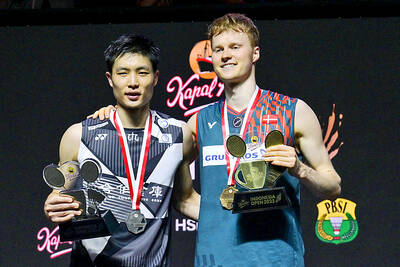For the country that invented judo, winning only one gold medal at last year’s London Olympics was like a humiliating flip onto its back.
However, Japan has now been given a fighting chance at reclaiming its dominance after judo’s ruling body changed the rules to promote a classic style that goes back to the sport’s ancient samurai origins. At this week’s world championships in Rio de Janeiro, the Japanese have already racked up three gold medals and are sitting on top of the medals table.
“The new rules make judo more traditional and that definitely favors the Japanese,” said Jimmy Pedro, a US Olympic coach and former world champion.

Photo: AFP
There are two main ways to win at judo: Throw your opponent to the ground so they land flat on their back or pin them to the ground until they submit, or for 20 seconds.
Japanese judoka typically focus on the martial art’s tradition of fighting while standing and throwing their opponents for an automatic victory. Judo players around the world who lack classic Japanese training often compensate by using strong grappling techniques that are less elegant, but still effective.
The new judo rules include changes that emphasize the sport’s standing techniques and outlaw direct attacks on the opponent’s legs, often used in countries with a strong wrestling background like Russia, who won the most gold medals in London. So far in Rio, Russia have only one bronze medal.
“You used to be able to beat the Japanese with some unorthodox gripping and with leg attacks, things they’re not used to, but now you have to retrain yourself not to do those things or you risk disqualification,” Pedro said.
The International Judo Federation (IJF) says the rules were changed to make judo more dynamic, not to help Japan win more medals.
“All countries which are promoting dynamic and spectacular judo based on [an attacking style] are doing well in Rio,” IJF spokesman Nicolas Messner said in an e-mail.
He said Japanese judoka were specialists in traditional judo, but that other countries are also capable of producing champions.
Still, Japan may be more motivated than others.
Masashi Ebinuma, who won his second world title on Tuesday, said he was not even focused on that goal this week.
“I wanted to make amends for my Olympic result,” he said, referring to his bronze medal in London.
Last year’s Games were the first Olympics since judo was introduced when the Japanese men were shut out of the gold medals.
“The Japanese are loving the new rules and they’re having a great run at the championships,” said Neil Adams, an adviser for the new rules and a two-time Olympic medalist from Britain. “Judo now looks like we think it should look, with lots of big throws and less wrestling.”
US champion Kayla Harrison, who won the US team’s first-ever judo gold at last year’s Games, said she was torn over the changes, saying they helped separate judo from other sports, but she was not sure they made it more exciting to watch.
“A lot of moves that were once part of judo have now been eliminated. You used to see people pick someone up mid-air, grab their legs and the next thing you know, someone’s on the ground,” she said. “It’s definitely not like that anymore.”
Though Harrison does not usually favor classic judo techniques, she will tweak her training program once she is back on the mat; she is currently sidelined with a knee injury.
“I think I’m going to be putting in a lot of time in Japan,” she said.

Badminton world No. 3 Anders Antonsen clinched his first Indonesia Open title yesterday after beating Taiwan’s Chou Tien-chen, while South Korea’s An Se-young won her second championship in Jakarta. The 28-year-old Dane sank world No. 7 Chou at the Indonesian capital’s Istora Senayan arena, winning 22-20, 21-14 in a 60-minute match to secure the prestigious Super 1000 event. Antonsen came out on top in a tightly contested first game before cruising to victory in the second. In a more closely fought women’s singles final, South Korean ace and world No. 1 An fought back from one game down to beat China’s

Italy crashed to a 3-0 loss away to Norway, as the four-time FIFA World Cup champions made a disastrous start to their 2026 World Cup qualifying campaign on Friday, while Belgium had to settle for a draw in North Macedonia. Alexander Sorloth, Antonio Nusa and Erling Haaland all scored in the first half in pouring rain in Oslo as Norway made it a night to forget for Italy, who missed out on the past two World Cups. “I have no explanation. Our supporters don’t deserve this kind of match. We need to do some soul-searching. It’s unacceptable,” Italy captain and goalkeeper Gianluigi

‘STILL’: In front of a packed New Jersey arena attended by Donald Trump and Mike Tyson, UFC 316 delivered high drama as Merab Dvalishvili retained his title Georgia’s Merab Dvalishvili scored a second-round submission win over Sean O’Malley to retain his bantamweight title at Ultimate Fighting Championship (UFC) 316 on Saturday, with Kayla Harrison also winning by submission in the co-main event, tapping out Juliana Pena to claim the women’s bantamweight crown. In front of a packed crowd at the Prudential Center in Newark, New Jersey, which included US President Donald Trump and retired heavyweight great Mike Tyson, Dvalishvili, a 34-year-old from the country of Georgia, won the belt in a convincing, although not aesthetically pleasing, unanimous decision. Dvalishvili (19-4) sat on top of the cage and shouted

Manchester City on Monday completed the signing of left-back Rayan Ait-Nouri from Wolverhampton Wanderers for a reported £31 million (US$41.8 million). The 24-year-old Algeria international has signed a five-year contract and will be available for the FIFA Club World Cup, which begins later this week. Ait-Nouri is expected to be just one of a trio of new City faces for that tournament with deals close to completion for AC Milan midfielder Tijjani Reijnders and Olympique Lyonnais playmaker Rayan Cherki. After missing out on a major trophy in the recently completed season for the first time since 2016-2017, City are hoping